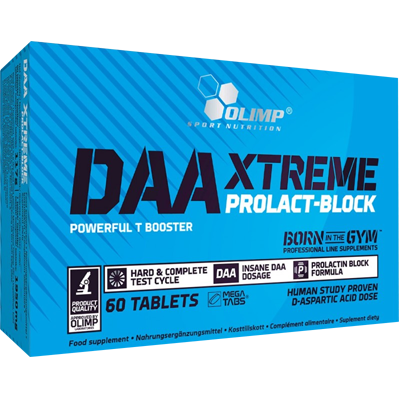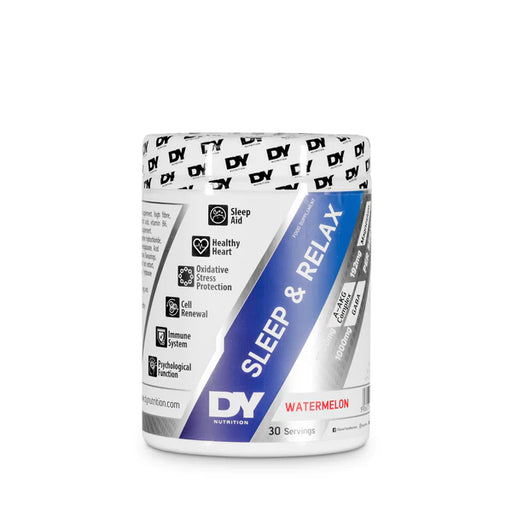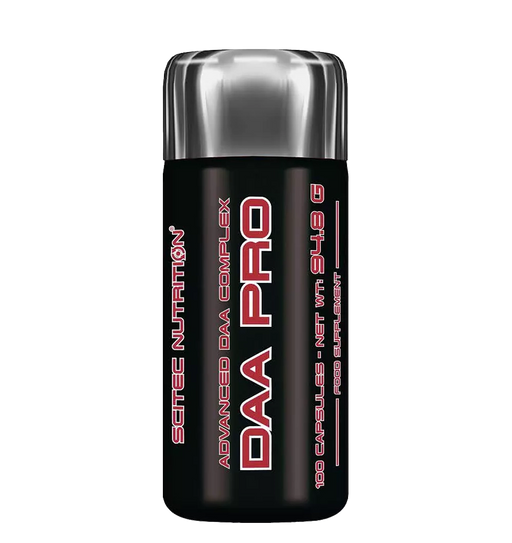D-Asparaginsäure
-
 Jetzt 11% sparen
Jetzt % sparen
Original-Preis €16,90Original-Preis €16,90 - Original-Preis €16,90Original-Preis €16,90Aktueller Preis €15,04€15,04 - €15,04Aktueller Preis €15,04|/
Jetzt 11% sparen
Jetzt % sparen
Original-Preis €16,90Original-Preis €16,90 - Original-Preis €16,90Original-Preis €16,90Aktueller Preis €15,04€15,04 - €15,04Aktueller Preis €15,04|/DAA Xtreme Prolact-Block · 60 Tabletten
Olimp Sport Nutrition2 reviewsOlimp Laboratories entwickelt Nahrungsergänzungsmittel zur Steigerung muskelaufbauender Hormone. DAA Xtreme Prolact Block ist eine alternative zu ...
Vollständige Details anzeigenOriginal-Preis €16,90Original-Preis €16,90 - Original-Preis €16,90Original-Preis €16,90Aktueller Preis €15,04€15,04 - €15,04Aktueller Preis €15,04|/Jetzt 11% sparen Jetzt % sparen -
 Ausverkauft
Original-Preis €29,90 - Original-Preis €29,90Original-Preis €29,90€29,90€29,90 - €29,90Aktueller Preis €29,90|/
Ausverkauft
Original-Preis €29,90 - Original-Preis €29,90Original-Preis €29,90€29,90€29,90 - €29,90Aktueller Preis €29,90|/Sleep & Relax + GH · 450g
DY NutritionNo reviewsVerbesserter Schlaf: DY Nutrition Sleep Relax fördert schnelles Einschlafen und tiefen, erholsamen Schlaf. Stressreduktion: Reduziert Stress und...
Vollständige Details anzeigenOriginal-Preis €29,90 - Original-Preis €29,90Original-Preis €29,90€29,90€29,90 - €29,90Aktueller Preis €29,90|/Ausverkauft -
 Jetzt 11% sparen
Jetzt % sparen
Original-Preis €14,90Original-Preis €14,90 - Original-Preis €14,90Original-Preis €14,90Aktueller Preis €13,26€13,26 - €13,26Aktueller Preis €13,26|/
Jetzt 11% sparen
Jetzt % sparen
Original-Preis €14,90Original-Preis €14,90 - Original-Preis €14,90Original-Preis €14,90Aktueller Preis €13,26€13,26 - €13,26Aktueller Preis €13,26|/DAA Pro · 100 Kapseln
SCITEC Nutrition1 reviewInnovativer DAA-Komplex: Speziell entwickelt, um Athleten und Fitnessbegeisterte mit einer hochwertigen Mischung aus D-Asparaginsäure, N,N-Dimeth...
Vollständige Details anzeigenOriginal-Preis €14,90Original-Preis €14,90 - Original-Preis €14,90Original-Preis €14,90Aktueller Preis €13,26€13,26 - €13,26Aktueller Preis €13,26|/Jetzt 11% sparen Jetzt % sparen
Was ist D-Asparaginsäure – DAA?
D-Asparaginsäure, die auch unter der Abkürzung DAA bekannt ist, ist die einzige natürlich im menschlichen Körper vorkommende D-Aminosäure. Sie ist auch in einigen Nahrungsmitteln wie Sojaprotein oder Kasein in Spuren enthalten. Im menschlichen Körper ist die Konzentration von D-Asparaginsäure in den Gewebetypen am höchsten, die für die Anregung der Testosteronproduktion, sowie die eigentliche Produktion von Testosteron verantwortlich sind. Dies sind die Hypophyse, der Hypothalamus und die Hoden.
Wie wirkt D-Asparaginsäure?
D-Asparaginsäure regt eine Erhöhung der Ausschüttung des Luteinizing Hormons (LH) und des Follikel stimulierenden Hormons (FSH) durch die Hypophyse an, welche den Hoden das Signal geben, mehr Testosteron zu produzieren. Besonders interessant ist hierbei, dass es anders als bei einer Verwendung von Steroiden oder Prohormonen nach dem Absetzen von D-Asparaginsäure nicht zu einer Unterdrückung der körpereigenen Testosteronproduktion kommt. Zusätzlich hierzu deuten wissenschaftliche Untersuchungen darauf hin, dass D-Asparaginsäure auch die Wachstumshormonspiegel im Körper signifikant erhöhen kann. Darüber hinaus kann D-Asparaginsäure die Stickstoffoxydproduktion deutlich steigern, wodurch die Blutzufuhr zu den Muskeln erhöht wird. Dies resultiert in einem stärkeren Muskelpump während des Trainings und einer besseren Versorgung der arbeitenden Muskeln mit Sauerstoff, Nährstoffen und anabolen Hormonen.
Eine wachsende Anzahl von wissenschaftlichen Untersuchungen unterstützt die Rolle unterschiedlicher biochemischer Verbindungen bei der Regulierung der Testosteronspiegel. D-Aminosäuren weisen eine andere Molekularform als L-Aminosäuren auf, von denen man früher angenommen hatte, dass sie die einzigen natürlich vorkommenden Aminosäuren sind. L-Aminosäuren werden durch Enzyme, die als Racemasen bezeichnet werden, in ihre D-Form umgewandelt.
Wissenschaftler haben herausgefunden, dass D-Aminosäuren – und insbesondere D-Asparaginsäure (DAA) – wichtige Rollen im Bereich des neurologischen und des endokrinologischen Systems spielen. D-Asparaginsäure (DAA) wird von den Nervenenden ausgeschüttet, um die cAMP Spiegel zu erhöhen und hierdurch die Neurotransmission zu regulieren. Im endokrinen System bildet DAA den Vorläuferstoff für N-Methyl-D-Aspartat (NMDA), welcher die Ausschüttung des GnR-Hormons durch den Hypothalamus induziert. GnRH regt dann die vordere Hypophyse dazu an, das Luteinizing Hormon (LH) zu produzieren, welches seinerseits an spezifischen Leydig Zellen der Hoden agiert, um letztendlich die Testosteronausschüttung zu erhöhen.
Wissenschaftliche Studien konnten zeigen, dass eine orale Gabe von etwa 3 Gramm D-Asparaginsäure die Testosteronspiegel bei gesunden jungen Männern mit natürlichen Testosteronspiegeln, die sich im normalen physiologischen Bereich befanden, innerhalb von lediglich 12 Tagen um durchschnittlich 42% erhöhen konnte.
Testosteron ist das für die Ausprägung der maskulinen Charakteristika mit Abstand wichtigste Hormon. Im Bereich des Bodybuildings konzentriert man sich häufig auf eine Erhöhung der Testosteronspiegel, um hierdurch das Muskelwachstum anzuregen und eine gesteigerte Muskelmasse und Kraft zu erreichen. Androgenrezeptoren im Muskelgewebe und im Zellkern der Muskelzellen ermöglichen es Testosteron, seine anabole Wirkung zu entfalten. Dies hat sich zu einem wichtigen Faktor für die Verwendung anaboler Steroide entwickelt, die jedoch die Gesundheit schädigen und ernsthafte Nebenwirkungen besitzen können. Die Verwendung von D-Asparaginsäure könnte eine sinnvolle, wenn auch nicht ganz so wirkungsstarke Alternative darstellen, die einerseits den Muskelaufbau durch erhöhte körpereigene Testosteronspiegel beschleunigt und andererseits nicht die Gesundheitsrisiken und potentiellen Nebenwirkungen von anabolen Steroiden mit sich bringt.
Was sind die Vorzüge einer durch D-Asparaginsäure gesteigerten Testosteronproduktion?
Testosteron ist das wichtigste Hormon für den Aufbau von Muskelmasse und Kraft und eine gesteigerte Testosteronproduktion ist deshalb gleichbedeutend mit einem schnelleren Aufbau von Muskeln und Kraft. Zusätzlich hierzu beschleunigt Testosteron die Regeneration, was zur Folge hat, dass Sie häufiger trainieren und öfter einen Stimulus für ein Muskelwachstum setzen können. Und da Testosteron auch das primäre männliche Sexualhormon ist, resultiert eine Erhöhung der Testosteronspiegel in einer gesteigerten Libido und einer gesteigerten sexuellen Leistungsfähigkeit.
Wer kann von einer Supplementierung mit D-Asparaginsäure profitieren?
- Männliche Sportler, die schneller Muskelmasse und Kraft aufbauen möchten
- Diätende Sportler, die ihre hart erarbeitete Muskelmasse vor einem diätbedingten Muskelabbau schützen möchten
- Männer ab 25, die einer natürlichen alterbedingten Reduzierung der Testosteronproduktion entgegen wirken möchten
- Anwender von Steroiden oder Prohormonen, die ihre körpereigene Testosteronproduktion nach dem Absetzen schneller wieder in Gang bringen möchten
Was sind die Hauptvorzüge von D-Asparaginsäure?
- Durchschnittliche Erhöhung der körpereigenen Testosteronproduktion um über 40% innerhalb von lediglich 12 Tagen
- Schnellerer Aufbau von Muskelmasse und Kraft
- Beschleunigte Regeneration nach dem Training
- Antikatabole Wirkung und Muskelschutz während einer kalorienreduzierten Diät
- Gesteigerte Libido und gesteigerte sexuelle Leistungsfähigkeit
- Erhöhung der Wachstumshormonspiegel
- Gesteigerter Pump und verbesserte Versorgung der Muskeln mit Sauerstoff, Nährstoffen und anabolen Hormonen
Einnahmeempfehlung
Auch wenn die Einnahmeempfehlung von Hersteller zu Hersteller und Präparat zu Präparat variieren kann, liegt die allgemeine Dosierungsempfehlung bei 3 Gramm DAA pro Tag. An Trainingstagen sollte diese Dosis etwa 45 Minuten vor dem Training und an trainingsfreien Tagen als Erstes morgens oder als Letztes abends auch nüchternen Magen eingenommen werden.
Fazit
Die Entdeckung von DAA scheint eine brauchbare Alternative zu Steroiden oder anderen leistungssteigernden Pharmazeutika zur Verfügung zu stellen. Auch wenn die wissenschaftlichen Untersuchungen mit DAA noch keine abschließenden Resultate geliefert haben und weitere detailliertere Studien benötigt werden, hat sich DAA als sehr vielversprechend herausgestellt. Anwender berichten im Allgemeinen von guten Resultaten mit einer spürbaren Erhöhung von Libido, Kraft und sogar Aggression. Bisher sind keine Nebenwirkungen von DAA bekannt.
Referenzen:
- D'Aniello, A, 'D-aspartic acid: an endogenous amino acid with an important neuroendocrine role' (2007) 53(2) Brain research reviews 215
- Di Fiore, MM et al, 'Opposing effects of D-aspartic acid and nitric oxide on tuning of testosterone production in mallard testis during the reproductive cycle' (2008) 6(1) Reproductive Biology and Endocrinology 28
- Gwartney, D., Testosterone (2011)
- Kadi, F, 'Cellular and molecular mechanisms responsible for the action of testosterone on human skeletal muscle. A basis for illegal performance enhancement' (2008) 154(3) British journal of pharmacology 522
- Topo, E et al, 'The role and molecular mechanism of D-aspartic acid in the release and synthesis of LH and testosterone in humans and rats' (2009) 7(1) Reproductive Biology and Endocrinology 120



